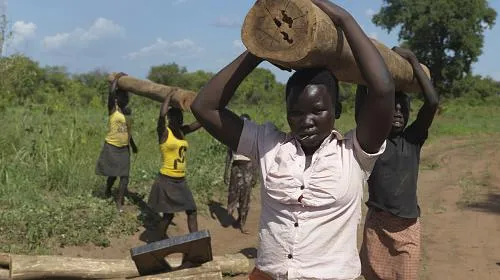KAMPALA- (June 14, 2017) — Ahead of the ‘Uganda Solidarity Summit on Refugees’ on June 22-23, the poverty-fighting organization CARE warns of the alarming health and safety risks for refugee women and girls fleeing the continuous fighting and famine in South Sudan. An average of 2,000 refugees are arriving daily into northwestern Uganda.
“The horror which South Sudanese women and girls have experienced in South Sudan due to the conflict and on their journey to Uganda are impossible to put into words. The majority arrive incredibly traumatized. Most walked for days or weeks through the bush without much food and water,” says Delphine Pinault, CARE’s country director in Uganda.
Since the spike in violence in South Sudan in July 2016, there has been a major influx of over 600,000 South Sudanese refugees in northwestern Uganda making it the lead refugee hosting country in Africa. There is now a total of 1.2 million refugees in Uganda with 900,000 from South Sudan. Women and children make up 86% of the refugee population. Due to the impact of the conflict on communities and households, women often take on the arduous displacement journey to seek refuge in Uganda without male relatives, carrying and caring for many children on the way.
“Many women and girls are burdened not only with the loss of their homes and loved ones but also with the experience of rape, sexual assault and physical attacks they have either personally experienced or witnessed in South Sudan. They also often cite fear of rape as a primary reason for fleeing the country,” Pinault says.
As the humanitarian refugee response in Uganda is chronically under-funded, women and girls arriving in Uganda don’t receive sufficient food, water, shelter and other basic supplies. “The significant lack of access to basic services is making refugee women and girls more vulnerable and reliant on negative coping strategies. Many don’t see any other way than to trade sex for food or engage in exploitative forms of labor. This perpetuates sexual violence, the risk of HIV or early marriages and unwanted pregnancies, creating even greater needs among refugee women and girls. It’s a vicious cycle that needs to be broken,” Pinault urges.
Refugees not only need food, clean water, shelter and emergency healthcare but also urgent psychosocial care to address the trauma that they have experienced in South Sudan and during their journey to Uganda. Without support, many withdraw into depression and alcohol consumption, which also leads to increased risk of violence in the settlements.
“One night when my husband was very drunk, he picked up a machete and was threatening to cut me. I was terrified. I grabbed the children and ran to a neighbor’s house, who told me to go to CARE for help. They provided us a safe place, food and counseling for me and my husband”, recalls Joyce, a 26-year old South Sudanese refugee at Imvepi settlement in Uganda.
“Uganda has one of the most progressive and favorable refugee policies in the world. But 1.2 million refugees are putting a tremendous strain on the country’s resources and the international community has a responsibility to share this burden with Uganda,” Pinault says.
Upon arrival into Uganda per the refugee policy, South Sudanese refugees are allotted a plot of land for shelter construction and agricultural production. Refugees have freedom of movement, the right to work, to access social services like school and health care but the system is stretched.
“For Uganda to continue its welcoming approach and keep its borders open, the country urgently needs more funding for the South Sudanese refugee response. We call on the international community to support the Government of Uganda and the UN’s call for $1.4 billion to urgently meet the immediate humanitarian needs as well as the longer term needs of refugees and the communities who host them.”
CARE is focusing on protection of women and girls, including prevention of sexual and physical violence in the settlements and access to services for survivors of violence, including psychosocial support, health care and legal support. CARE is also providing urgently needed sexual, reproductive and maternal health services for pregnant and breastfeeding mothers. For the most vulnerable refugees with special needs, CARE is assisting with shelter construction. To date, CARE has reached over 42,000 refugees with reproductive health and violence prevention, care and support services, and 1,600 with shelter.
Learn more about the humanitarian crisis in South Sudan
Learn more about CARE’s work in South Sudan
About CARE
Founded in 1945, CARE is a leading humanitarian organization fighting global poverty. CARE has more than six decades of experience helping people prepare for disasters, providing lifesaving assistance when a crisis hits, and helping communities recover after the emergency has passed. CARE places special focus on women and children, who are often disproportionately affected by disasters. To learn more, visit www.care.org.
Media contacts
Nicole Harris, Media Relations Manager, nharris@care.org, 404-735-0871

